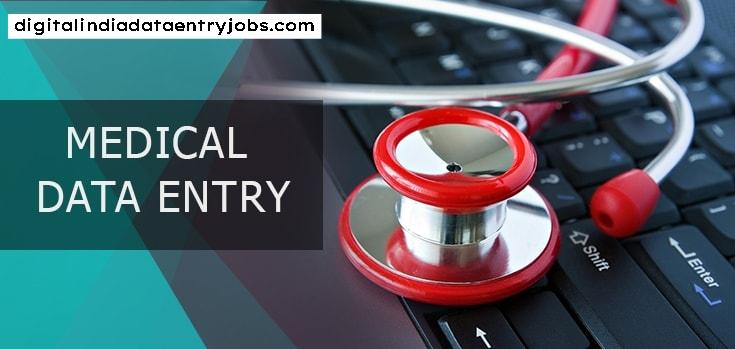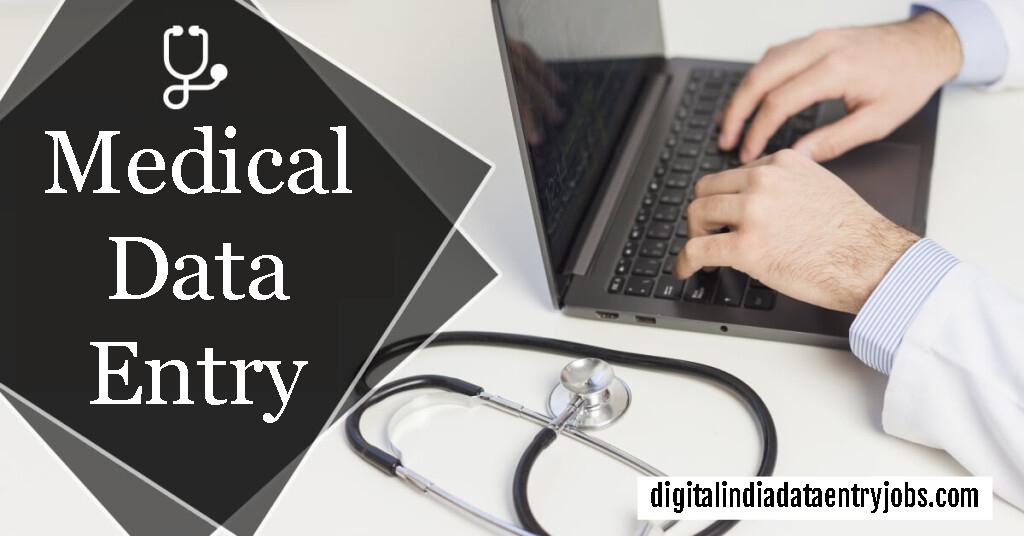Medical Data Entry:- When employing skilled data entry workers, medical offices place a great priority on training and experience. A medical data entry professional enters patient information into an electronic health record using a predetermined procedure. Clinicians are more equipped to understand lab results and make well-informed medical decisions because of this data input. The data entry specialist should make sure that the information being entered is accurate and thorough. Medical terminology, computers, and standard operating procedures are among the other topics covered in training for medical data entry clerks. Entering both numbers and letters, such as patient names and addresses, is known as alphanumeric data entry. Medical Information Input
Effective medical data entry enhances patient care, expedites medical processes, and produces better results.
Accurate and quick data entry enables healthcare providers to make well-informed decisions and deliver individualized medicines.
This essay looks at the importance of entering medical data, the challenges with the current process, and how modern technology—like artificial intelligence—can boost output.
It features case studies of successful implementations together with discussions and predictions about the future of interoperability and data sharing.
Contents
What is Medical Data Entry?
Medical data input involves entering relevant patient data, such as treatment plans, diagnostic results, and medical history, onto digital systems such as Electronic Health Records (EHRs).
For healthcare professionals to provide effective patient care, make informed decisions, and optimize healthcare operations, fast and correct data entry is crucial.
Also Read:- Data Entry Specialist, Indnewsupdates, Digitizeindiagov, Onlinereferjobs

Medical data entry description
The data entered needs to be accurate, complete, and timely in order to ensure that patients receive the necessary care. Thus, in order to ensure that the correct information is acquired, numerous inquiries are made during the data input process, including full patient names, phone numbers, physical addresses, medical histories, and insurance information. Guidelines for Expert Information Entry. The provider makes sure that data privacy laws are followed and double-checks all required information before entering it into the electronic health record system. Healthcare practitioners can rapidly access and update patient information by using electronic health records, or EHRs.
What are your qualifications for data entry?
Describe medical data entry in more detail. Asking about the patient’s medical history and present problems, as well as the reason or purpose of the visit or admission, is also necessary. Compiling, analyzing, and entering patient data into computerized systems constitute medical data entry. Entering patient data into an electronic health record system accurately and quickly is known as medical data entry. Electronic data entry is the most widely used form of data input in the healthcare industry. Utilizing specialized software to identify and convert spoken words into text-based data, voice recognition data input operates.
The Role of Medical Data Entry Jobs in Healthcare?
The healthcare business relies heavily on medical data entry tasks, which have a wide range of effects on decision-making, patient treatment, and healthcare management.
Among the most important responsibilities in medical data entry are the following:
1. Patient Care
Patient care, or providing patients with medical attention and support in all its forms, is the main objective of healthcare. Promoting recovery and well-being, entails assessing patients’ health, providing diagnoses, developing treatment programs, and delivering therapies.
Effective patient care aims to enhance overall health outcomes and the patient experience; major components include empathy, compassion, and individualized attention.
Healthcare providers collaborate across disciplines to provide comprehensive care while taking the patient’s medical needs, as well as their emotional, psychological, and social needs, into account.
2. Decision-Making
Making the right decisions for patient care and management is an essential component of decision-making in the healthcare sector.
Using medical data input services, healthcare providers evaluate patients’ conditions, make diagnoses, and choose the best course of treatment.
Making judgments that might improve patient outcomes requires effective decision-making, which takes into account potential risks, benefits, and patient preferences.
To provide safe, ethical, and patient-centered care in a dynamic and ever-evolving medical environment requires interdisciplinary collaboration, continuous results review, and a commitment to these traits.
Also Read:- Data Entry Clerk Jobs, scholarships gov, Mobilenumbertrackeronline, Nebsit Council

3. Continuity of Care
Continuity of care, in the medical field, refers to the orderly and smooth provision of medical services to patients while they move between several institutions or interact with a variety of healthcare professionals.
Establishing a full understanding of patients’ medical histories and ongoing treatment plans requires maintaining open lines of contact and exchanging medical information.
By delivering care consistently and without interruption, continuity of care promotes a comprehensive approach to patient management, reducing the chance of medical errors, raising patient satisfaction, and fostering better health outcomes.
4. Research and Analysis
Healthcare research and analysis involve the methodical investigation and evaluation of medical data, treatments, and outcomes in order to progress scientific understanding and improve patient care.
To look into illness trends, treatment outcomes, and healthcare practices, researchers use a variety of methodologies. Patterns, linkages, and potential areas for improving healthcare service are found through data analysis.
Evidence-based research findings are critical to developing medical guidelines and best practices, advancing the field of medicine, and ultimately raising patient outcomes and healthcare standards.
5. Healthcare Efficiency
In order to deliver prompt, economical, high-quality patient care, healthcare systems and staff must be optimized. This is known as healthcare efficiency. It comprises cutting unnecessary delays, optimizing workflows, and streamlining administrative expenses.
Effective healthcare systems place a high priority on technology, standardized practices, and interdisciplinary cooperation to enhance provider coordination and communication.
Through productivity gains and inefficiencies eliminated, healthcare business process outsourcing seeks to optimize the value of healthcare services, improve patient satisfaction, and provide the best possible health outcomes for individuals and groups.
6. Billing and Reimbursement
In the medical field, billing and reimbursement handle the financial parts of providing medical services. Healthcare providers produce accurate bills that precisely detail the services rendered and related costs.
After that, these bills are sent to patients or insurance companies for payment. Reimbursement involves getting money from insurance companies or patients to cover medical expenses.
Adequate billing and reimbursement practices are essential for healthcare organizations to remain financially sustainable, provide fair compensation for rendered services, and preserve financial transparency in the industry—all of which are advantageous to patients and providers.

Also Read:- Remote Data Entry Jobs Near Me, Companycontactdetail, Uidaionlineaadharcard, Typingspeedtestonline
Conclusion
Standardized patient care and streamlined healthcare procedures through efficient medical data entry. Artificial intelligence (AI) and interoperable systems have promise for solving many of the issues facing society today.
By improving precision, judgment, and research abilities, optimized data intake contributes to the development of a more effective and patient-centered healthcare system, opening the door to greater results and a brighter future for healthcare management.
FAQs
Q.) What use do hospitals’ data entry services serve?
Ans. Virtual data entry services assist hospitals in updating patient profiles, medical claims, bills and transcriptions, medical scans and reports, financial and accounting data, and patient records in an organized way for future use and process efficiency.
Q.) What are the advantages of medical data entry services for the healthcare industry?
Ans. Data entry services enable the healthcare industry, including hospitals, to provide high-quality services with less paperwork. The ability to store and retrieve data for extended periods of time is combined with improved data security. Hospitals may now provide services more quickly and efficiently while also increasing productivity and lowering the possibility of errors.
#Saras

